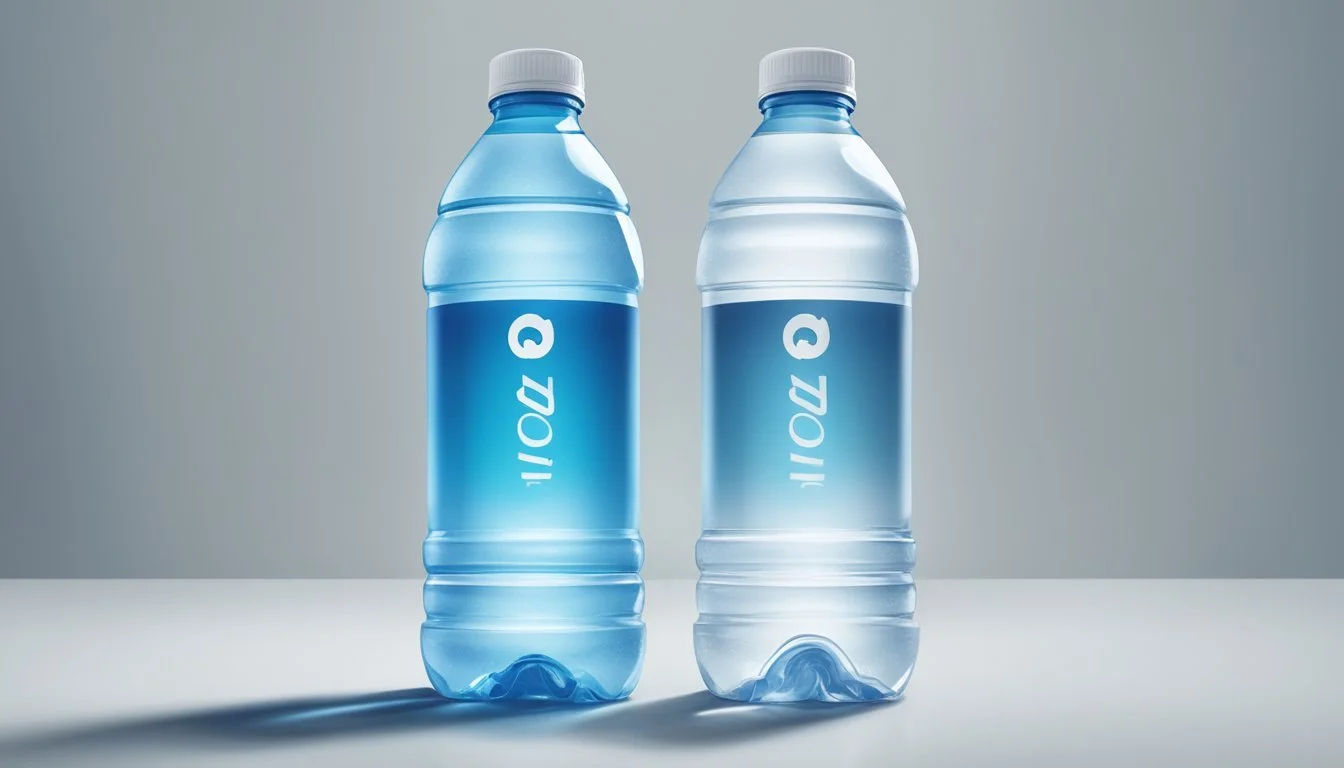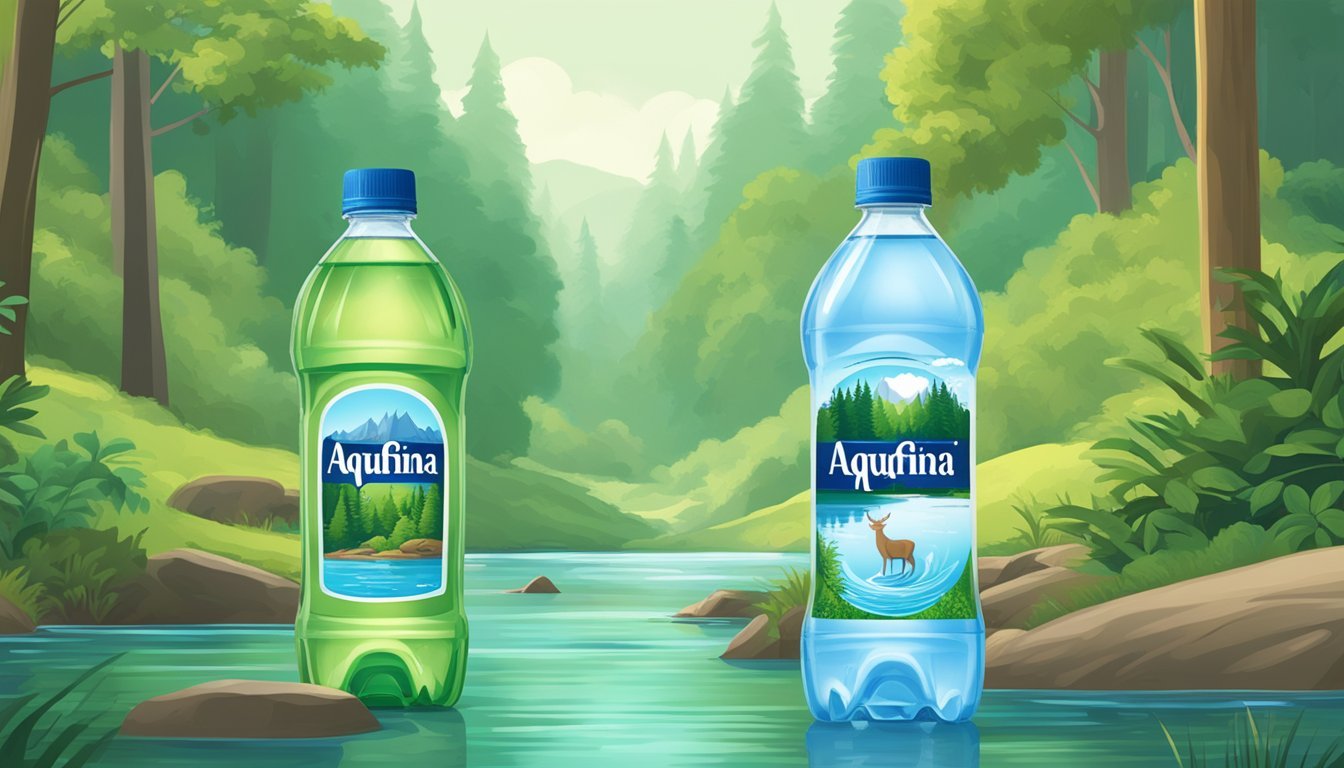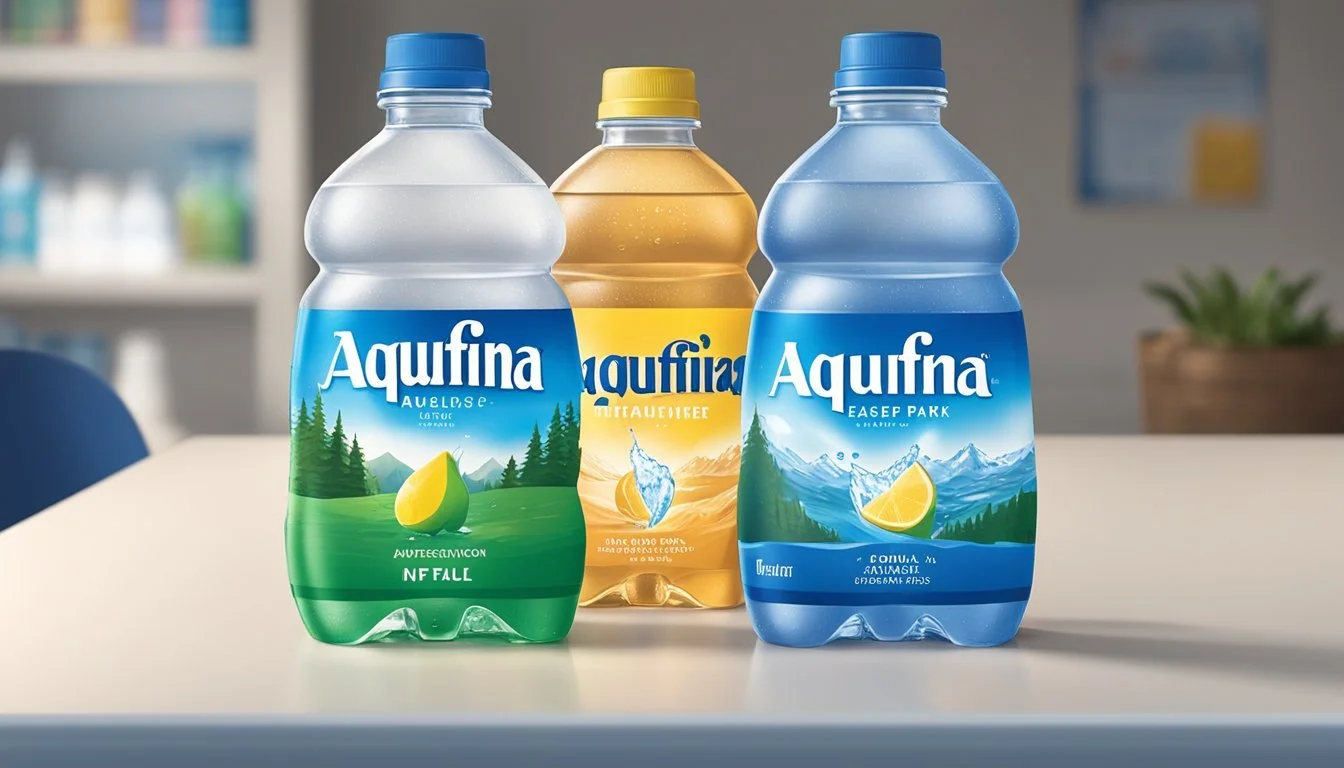Aquafina vs. Deer Park
A Clear Comparison of Bottled Water Brands
When consumers reach for a bottle of water, they are often met with a plethora of choices. Among those choices, Aquafina and Deer Park stand out as widely recognized brands, each with its own following. Aquafina, produced by PepsiCo, is known for its purification process, resulting in a smooth and clean taste. Deer Park, on the other hand, brands itself as 100% natural spring water sourced from various springs along the Eastern Seaboard of the United States.
The debate over which bottled water brand is "better" can be subjective and often boils down to individual preference. Factors such as taste, purity, source, and even bottle design can influence consumer choice. Aquafina boasts its seven-step Hydro-7 purification system which includes reverse osmosis, ozone sterilization, and UV treatment. Deer Park touts its natural origins, emphasizing the crisp taste that comes from spring water without additional filtration processes.
A comparison between Aquafina and Deer Park requires an examination of the qualities that each brand offers. It involves assessing the methods of water sourcing, filtration techniques, packaging sustainability, and price points. Consumers may also consider the environmental impact of the bottling process, the presence of any additives or chemicals, and the level of mineral content which can vary between purified and spring water products.
Understanding Bottled Water
When considering the choice between different bottled water brands, it is essential to note the variety available, the role of the industry, and the health implications of consuming bottled water.
Types of Bottled Water
Spring Water: This type of water comes from an underground formation from which water flows naturally to the surface. Mineral Water is similar but must contain at least 250 parts per million total dissolved solids. Purified Water, on the other hand, is highly treated through processes such as distillation, deionization, or reverse osmosis to remove impurities.
The Bottled Water Industry
The industry is extensive and highly competitive, with numerous brands vying for market share. Safety and quality regulations differ by country, but in the United States, the Environmental Protection Agency (EPA) oversees tap water while the Food and Drug Administration (FDA) regulates bottled water. Brands often compete on the purity, source, and mineral content of their water, as well as the environmental impact of their packaging.
Health Implications of Bottled Water
Consumers often perceive bottled water as a healthier alternative to tap water. However, most bottled waters meet or exceed the same safety standards as tap water. It is crucial for bottled water to be free of contaminants and properly treated to avoid health risks. Some brands may offer added electrolytes or claim a specific pH balance, promoting potential health benefits.
Profile of Aquafina
Aquafina is a brand of purified bottled water that has carved out a place in the market through its distinctive purification process and commitment to taste and purity.
Production Process
Aquafina utilizes a comprehensive purification process that includes reverse osmosis, ultraviolet, and ozone sterilization. The brand prides itself on this process, which is designed to remove substances from water that may affect taste and purity. The source of Aquafina's water comes from public water supplies, which is then transformed through their treatment process to meet the brand's standards for purity. Each bottle is clearly labeled to assure consumers of the rigorous purification steps that have been undertaken.
Taste and Purity
In terms of taste, Aquafina aims to provide a clean and crisp flavor profile by removing dissolved solids and other impurities that can alter the taste of water. The brand's commitment to purity is evidenced through its multiple-step purification system that is meticulously designed to ensure that each bottle of Aquafina maintains consistency in both taste and quality.
Profile of Deer Park
Deer Park boasts a long history of providing natural spring water, highlighting its commitment to a clean and refreshing taste enriched with naturally occurring minerals. This brand has staunchly positioned itself as a reliable choice for hydration.
Source and Natural Elements
Deer Park Natural Spring Water originates from carefully selected springs located across the Eastern Seaboard. The company has consistently emphasized its dedication to offering 100% natural spring water to its customers.
Key Minerals: The spring water from Deer Park contains a blend of natural minerals, which are appreciated for contributing not just to the water's taste but also to its overall quality. These minerals help create the characteristic crispness that Deer Park water is known for.
Flavor Profile
Deer Park's flavor profile is marked by its:
Taste: A light, clean, and crisp taste that many consumers find refreshing.
Quality Comparison: Regular drinkers of Deer Park often compare it favorably to typical tap water, suggesting a more refined experience, without heavy processing or the taste of additives.
Comparison of Aquafina and Deer Park
In the realm of bottled water, Aquafina and Deer Park offer distinct options regarding their taste, source, and quality of water. This section explores these differences in a factual and concise manner.
Taste and Water Source
Aquafina is a brand owned by PepsiCo, and its water is sourced from municipal supplies, undergoing a purification process that includes reverse osmosis and other filtration methods. The taste of Aquafina is generally characterized as clean and pure.
Deer Park, on the other hand, is a brand of Nestlé Waters and sources its water from springs across the Eastern US. Deer Park's taste is often described as natural and fresh, with a slight mineral flavor due to its spring source.
pH Level and Alkalinity
Aquafina has a pH level generally close to 5.5, which makes it slightly acidic. Conversely, Deer Park tends to have a pH level ranging from 6.3 to 7.7, depending on the specific spring source, placing it in the neutral to mildly alkaline range.
Environmental Impact
Both brands are packaged in plastic bottles, but the parent companies have outlined sustainability plans. Aquafina has committed to reducing plastic use and increasing recycling rates. Deer Park emphasizes its use of recycled materials and protection of the natural springs from which it sources its water.
Price and Accessibility
Regarding price, both Aquafina and Deer Park are competitively priced and widely available throughout the United States. Aquafina typically has a price point that is comparable to other purified waters, while Deer Park's spring water may be slightly more expensive based on the region. Both brands provide convenience in availability, with widespread distribution in stores and online retailers.
Health and Safety Standards
When selecting between Aquafina and Deer Park bottled water, consumers often consider health and safety standards paramount. The safety of bottled water is overseen by regulatory bodies and assessed by the presence of contaminants, providing assurance of quality and safety for the consumer.
Regulation and Compliance
Aquafina, a product of PepsiCo, adheres to the stringent standards set by the Food and Drug Administration (FDA). As a purified water, it undergoes a sophisticated filtration process which includes reverse osmosis and other advanced methods to meet the FDA's definition of purified water. This ensures that Aquafina meets federal health and purity regulations before reaching the consumer.
Deer Park, owned by Nestlé Waters North America, is categorized as natural spring water. It is sourced from springs and is subject to the Environmental Protection Agency (EPA) standards for tap water, as well as FDA regulations for bottled water. This dual regulation underscores Deer Park's commitment to maintaining compliance with health and safety criteria.
Contaminants and Water Safety
Contaminants are a significant concern for consumers when it comes to bottled water. Both brands monitor for a range of substances including lead, fluoride, and synthetic compounds like PFAS chemicals—often referred to as "forever chemicals" due to their persistence in the environment.
Aquafina ensures that the levels of contaminants like lead and fluoride are significantly reduced through its treatment processes, which can create water that is as pure as, or purer than, most tap waters.
Deer Park states that its natural spring water undergoes rigorous testing for contaminants, and the brand maintains transparency by publishing water quality reports. Deer Park's sourcing from protected springs typically results in a water profile that incorporates natural minerals while staying within safety limits for contaminants such as PFAS chemicals.
Consumers looking for the safest bottled water should investigate independent test results and water quality reports from both brands to make an informed decision based on the latest data available for health and safety standards.
Consumer Preferences
When determining whether Aquafina or Deer Park is the better bottled water brand, consumer preferences play a crucial role. These preferences can be largely categorized into two main sections: Branding and Consumer Loyalty, and Water Taste and Quality Perception.
Branding and Consumer Loyalty
Aquafina, a product of PepsiCo, and Deer Park, which is owned by Nestlé, both benefit significantly from their parent companies' strong brand presence in the United States. Aquafina leverages PepsiCo's broad distribution network, which can influence customer loyalty due to its widespread availability. Conversely, Deer Park enjoys a strong regional following, particularly in the eastern states where it is often synonymous with freshness due to its branding that emphasizes natural origins.
Consumer Loyalty Factors:
Aquafina:
Distribution Network
PepsiCo Branding
Deer Park:
Regional Preference
Nestlé's Environmental Initiatives
Water Taste and Quality Perception
The perception of water taste and quality significantly affects consumer choices. Aquafina prides itself on its purification process, boasting a clean and pure taste that appeals to consumers seeking a consistent flavor profile. Deer Park, on the other hand, emphasizes its natural spring water source, which can lead to slight variations in taste but is often preferred by consumers who appreciate a more 'natural-tasting' water. The quality perception is also shaped by reports concerning water purity and potential contaminants; these findings can either bolster or diminish consumer trust in a brand.
Water Taste and Quality Factors:
Aquafina:
Purified Water
Consistency in Flavor
Deer Park:
Spring Water
Natural Taste Variations
Both brands aim to satisfy a broad spectrum of consumer preferences across different states in the United States, with Coca-Cola and Nestlé actively tailoring their branding and water offerings to align with consumer expectations in the bottled water market.
Environmental and Ethical Considerations
When selecting bottled water, consumers must consider the environmental and ethical impacts associated with their choices. Differences in production processes, resource sourcing, and packaging disposal contribute distinctively to ecological footprints.
Bottled Water vs. Tap Water
Bottled water companies such as Aquafina (owned by PepsiCo) and Deer Park (owned by Nestlé) have faced scrutiny regarding the environmental impacts of sourcing and bottling water. Both tap water and bottled water are subject to safety standards; however, tap water tends to have a lower environmental impact. It generally requires less energy and resources to process and deliver to the consumer. In contrast, bottled water necessitates transportation, which contributes to greenhouse gas emissions, and the use of plastic bottles, which can lead to increased waste if not recycled properly.
Nestlé, for example, has been criticized for its water sourcing practices, which sometimes involve drawing water from natural springs or aquifers that are also relied upon by local communities. This raises ethical concerns regarding the right to access clean water.
Footprint of Single-Use Plastics
The environmental footprint of bottled water is also shaped by the packaging materials used. Plastic bottles are often single-use and can contain chemicals like BPA (Bisphenol A), although many companies have transitioned to BPA-free products. The production and disposal of these plastics require significant resources and can lead to environmental pollution if not managed correctly.
Recycling Rates:
Aquafina: Utilizes PET plastic bottles, which are recyclable, but recycling rates vary significantly by region.
Deer Park: Offers bottles made with 50% recycled plastic in some products, promoting somewhat improved sustainability.
Environmental Initiatives:
Both brands have made commitments to reduce their environmental impact, with pledges to increase recycled materials in their bottles and streamline their production processes for efficiency.
Despite the convenience of bottled water, its environmental and ethical implications make it a complex choice for consumers. They must weigh the benefits of easy access to hydration against the potential harm to ecosystems and moral dilemmas arising from the commodification of a vital resource like water.
Expert Opinions and Research Findings
Comparative analyses and expert insights have been pivotal in determining which bottled water brands stand out in quality and safety. This section delves into the specifics of what studies and experts have found about Aquafina and Deer Park.
Studies on Bottled Water Brands
Recent scientific research has assessed various bottled water brands on factors such as purity, mineral content, and potential presence of contaminants. Aquafina, a product of PepsiCo, is known for its rigorous purification process, which includes reverse osmosis and other filtration methods. Studies have indicated that Aquafina is one of the purest waters available, with a consistent taste and quality.
Deer Park, on the other hand, prides itself on sourcing water from natural springs and emphasizes the mineral content that contributes to its taste profile. While the overall quality is high, it's less uniform than Aquafina, since spring water composition can vary amongst different sources.
Expert Recommendations
Water quality experts tend to recommend bottled water that offers both purity and a beneficial mineral composition without excessive additives. It is not uncommon for consumers to turn to social media platforms like Twitter for real-time opinions on the taste and quality of bottled water brands. In quantifying brands from best to worst, third-party endorsements have generally placed Aquafina high due to its purity, while Deer Park is often celebrated for its natural sourcing and taste.
High-quality water signifies different attributes to different experts: some prioritize the absence of contaminants, while others value the presence of natural minerals. Aquafina and Deer Park each have their advocates, with the former typically earning points for pure, consistent water, and the latter being credited for its natural mineral content and regional sourcing.
Alternative Water Solutions
While brands like Aquafina and Deer Park are popular bottled water choices, consumers increasingly consider alternative solutions for their hydration needs, focusing on sustainability and health.
Home Water Filters
Brita filters are a staple for many households, easily integrating into pitchers or attaching directly to faucets. Their activated carbon filters are designed to reduce common tap water contaminants, such as chlorine and lead, enhancing taste and quality.
Pros: Convenient, reduces plastic waste, cost-effective over time.
Cons: Regular filter replacements are necessary.
Innovations in Water Bottling
Innovative companies are revamping the way water is bottled and consumed. JUST Water offers a plant-based carton, aiming to reduce plastic usage and carbon footprint while maintaining purity and taste. Meanwhile, bottles from LIFEWTR are made with 100% recyclable plastic, and the brand emphasizes their commitment to showcasing art and creativity on their labels.
La Croix has popularized sparkling water, provided in cans, and offers a refreshing alternative to still water with a variety of flavors.
Pros: Better for the environment, promotes recycling, creative and aesthetic packaging.
Cons: May still contribute to overall packaging waste if not properly recycled.






